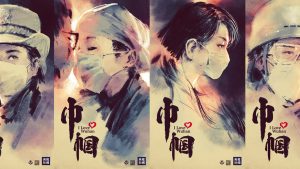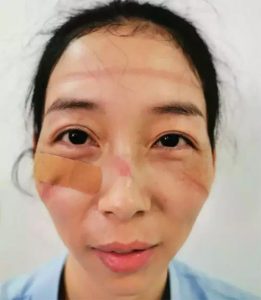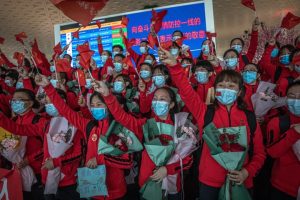3 Do not adorn yourselves outwardly by braiding your hair, and by wearing gold ornaments or fine clothing;
4 rather, let your adornment be the inner self with the lasting beauty of a gentle and quiet spirit, which is very precious in God’s sight. [1 Peter 3:3-4, NRSV]
At Mass on the International Nurses Day on Tuesday May 12, Pope Francis offered special prayers for nurses. Noting their heroism in this COVID-19 pandemic, he called their profession “a vocation, a dedication.” Not only have medical staff (doctors, nurses and others) been on the front lines of the pandemic, but in many cases, they have been most at risk due to prolonged exposure to the virus, long hours with little sleep and, in some cases, with a shortage of PPE. Tens of thousands of health-care workers worldwide are believed to have been infected with the virus, and hundreds of nurses have lost their lives. This day helps “humanity to rediscover the fundamental importance of their role”; their dedication makes them among the “saints next door”. They are “an image of the Church as a ‘field hospital’ that continues to carry out the mission of Jesus Christ, who drew near to and healed people with all kinds of sickness and who stooped down to wash the feet of his disciples.” As a tribute to all the pandemic heroes and the spirit that drove them in their humanitarian contributions, we seek to observe, learn, and “rediscover” a little about the spirit of sacrifice and the seriously hard and dangerous work carried out by the female nurses who dashed to Wuhan.
[1] Speeding life-saving personnel and materials to the epicenter
In this COVID-19 pandemic, which first exploded in Wuhan (scientists are still tracing the native origin of the virus), humanity in China suffered a very dark moment in history as the microscopic virus threatened its communities. Individuals, groups, industrialists, sensing their social duties, rallied to the urgent call to mobilize resources in aid of the singular goal of saving lives. At its core, the dominant spirit was about community, about building hope, and about joining hands in nurturing all through a time of darkness. At the peak of the crisis, more than 150,000 medical workers toiled to exhaustion in Wuhan alone, and one third of them were women. As the nation was at the cusp of a major outbreak, they sped as volunteers from across China direct to the epicenter to help in containment. They knew it; frontline medical work at the best of times and circumstances would place their lives in serious danger, let alone at such madly chaotic time and circumstance as Wuhan must inevitably be at the start of the crisis. And some of them did lose their lives in the early days. But they went, driven by the conviction that their work, while life-threatening to themselves, would be life-saving and life-generating to others. Hotel operators close to Wuhan hospitals at once offered free accommodation to support them. Others, able and willing to render help in all fields, burst into action expending time, energy and money in a heart-warming and hope-generating show of “unity is power” [团结就是力量].
[2] Why were they in Wuhan? Why were they doing this “crazy” punishing work?
“I am a medical worker. If I don’t rush to front lines to help at this time, I will regret it.” She and her colleagues literally risked their lives to do this, especially at the very beginning when things were inevitably chaotic at the epicenter of the epidemic. Given the initial coordination difficulties, personal protection for medical staff might not be fully in place at first. The reality, in any event, was that they were making untold personal sacrifices so that others would live!
Their profound spirit found ready support in a blogger who noted: “Human beings are members of one another, since in their creation they are of one essence. When the conditions of the time bring a member (limb) to pain, the other members (limbs) will suffer from discomfort.” This philosophy prompted Le Yucheng, the Chinese Vice Foreign Minister, to comment in his interview with US television network NBC that “as a nation we look out for each other.” We observe in this pandemic, a fundamental human resilience, a deep respect for human life, and a strong sense of community.
[3] An exhausting day of endless steps
When a young nurse, all geared up, was asked how many steps she took in a day, she said that the nurses rushed around the whole day, non-stop. She spoke in a hurry, “We are busy all the time, everyday. We have to be on the move all the time. I think I’m fine.” She did not think it was in any way meaningful to engage in counting the number of steps she made in a day.. Engaged as she was in a high-tensioned space and time in the noble work of fighting to save human lives; she couldn’t possibly care two cents for a leisurely conversation on step-counts in fitness-tracking.
[4] Caring, consoling and encouraging patients
A photo-journalist watched a nurse asking an elderly female patient, “Are you hungry? Would you like something to eat now? Let me wipe your sweat…” To his left, the journalist heard another nurse consoling an elderly male patient, “Don’t worry, uncle,” she said. “Hang in there. You will be alright.”
- As Christians, we observe that it was Jesus’ mission to heal the sick. He is the Messiah and the Divine Physician, not us. But he desires the work of healing to continue, so we become God’s co-workers (1 Cor 3:9). On this, we have St Teresa of Avila’s reminder that “Christ has no hands but yours.” Then Christ himself took it a step further by giving value to each and every act of kindness done to a patient, for he is in each one of them: “I was sick and you visited me” (Matthew 25:36).
This is “a field hospital” in real time – being with those in real need, attending to the wounded, comforting and encouraging them, conversing with them, respecting their dignity., and honouring the Christ in them.
[5] Sacrificing pretty locks and wearing diapers
Most female nurses chose to bob their hair, so that they could put on the protection gear easier and faster. Some, especially those from the other provinces heading to Wuhan, chose to shave their heads before shipping out. Pretty locks are understandably treasured; some women were even engaged to be married. An element of personal sacrifice is evident here. Their aim was two-fold: to prevent the infection from spreading via exposed hair, and to save time in putting on and taking off protective gear. In critical viral containment work as in Wuhan, time pressure for medical staff is extreme, and time-saving is considered crucial. Other extreme measures being taken included wearing adult diapers instead of taking bathroom breaks and avoiding having to strip out of their tightly taped-up biohazard suits.
[6] Every nurse is a Hercules
Someone observed, “But that’s a lot of strenuous work and these are all girls. They are all women.” The response, with a casual laugh: “Here, there’s no gender distinction. Everyone here is a Hercules. In Shanghai dialect, its called ‘all-match’. ‘All-match’ means you should go wherever you are needed. I’m not just an angel in white. I am also a soldier in white. I am not fighting alone.” On the International Women’s Day, Chinese President Xi-Jinping, expressed gratitude to female medical workers, whom he said “worked tenaciously, shouldering a massive amount of work and making an important contribution in containing the epidemic.”
[7] Exhausted and rest-deficient
Overworked and exhausted medical staff fell asleep in full protective gear, after working gruesome and long working shifts trying to contain the deadly Coronavirus. They did so wherever they could lay their heads and exhausted bodies. This included floors, benches and chairs, any spot convenient. Some of the pictures showing medical staff resting from exhaustion fighting the killer virus were posted on social media with the caption ‘they are the true heroes of this country’.
And yet, from these same fatigued nurses, at the frantic early days of the crisis, one said in cracking voice and with tears in her eyes at an interview, “It was so heart-breaking to have to tell patients that there is simply no spare bed for them.” From another jaded colleague, we hear this heart-wrenching comment: “Even in my sleep I see the images of the suffering patients.”
[8] Emotional costs
“My special status,” a nurse said, “allows me to see a lot of things that others might not see. But my daughter has just turned a year and a month old, and I haven’t seen her for 38 days.” Asked if she wanted to say anything to her family, she replied, “No, not now, because I don’t want to cry, as my goggles will fog up and I won’t be able to do any work for a while. I’m sorry.” Like her, a young couple – husband and wife – both at the frontline, have not seen their son for ten days. The woman wiped off tears from the corners of her eyes. As she spoke, her eyes told a painful story of unavoidable suffering and pain from separation with her little loved one. When the father of another nurse died of Covid, and buried without her seeing “his face for one last time” [见最后 一面], she howled in pain and remorse, lamenting the untold sacrifices she and many like her have had to make. Yet, she knew that all she could do was to bury her pain deep in her heart and continued with this mad rush to save other lives. The emotional toll is also apparent in some doctors passing breaking point as they struggled with an ever-increasing volume of cases. Candice Qin, a therapist from Beijing, told The Washington Post: “I think it is a strain for every doctor and every nurse in Wuhan, both physically and mentally. We know that patients are worried, but we should bear in mind that doctors are just as human as well.”
[9] Physical scars
“I look so ugly, haha…,” a nurse said wryly at the end of her shift, her face full of bruise-marks left by her goggles. The virus is taking a physical toll on medical staff, leaving some with skin bleached white from disinfectant and their faces marked by lines from masks digging into their skin. Still, you could also hear some nurse sounding rather upbeat: “This is the best moment of the day. I feel like I have the whole world…” Some bloggers seem amazed by the conditions these nurses have to endure. But, physical and mental exhaustion comes with the territory for medical staff working under such a crisis condition.
[10] Mission accomplished
You need to go to Youtube to check out the local residents giving them a heroes’ sent-off once the medical workers’ hard fight against the COVID-19 outbreak in Wuhan was done. And then see how they dignify and respect their heroes as these workers arrive back in their home cities in different regions of China. Occasionally, you see young and old, whose families were saved from the brink in this harrowing pandemic, kneeling on the road side and bowing as a gesture of their gratitude, as the coaches carrying departing medical volunteers drove past them. Sometimes you see a single or a group of marines and soldiers snapping spontaneously to attention in respectful salute. All this, and more, warms hearts and generates faith in the goodness of humanity made in the image of God whatever the colour of your skin, the flag you swear allegiance to, or the creed or none that you profess. The nurses, and the people of Wuhan, have moved from pain to hope, from darkness to light, from death to new life; that’s the essence of the paschal journey. and a cause for celebration.
A light-hearted report rounds things up nicely
- As spring arrives, many of the visiting medical workers had their first glimpse of Wuhan’s scenery on their way home. They said it was a pity they had no time to appreciate the city’s beauty, its landmark Yellow Crane Tower, its famous cherry blossoms at Wuhan University, or have time to taste Wuhan’s famous hot dry noodles. These experiences will have to wait until a better time, but they are happy to go home with a mission well accomplished.
Copyright © Dr. Jeffrey & Angie Goh, May 2020. All rights reserved.
You are most welcome to respond to this post. Email your comments to jeffangiegoh@gmail.com. You can also be dialogue partners in this Ephphatha Coffee-Corner Ministry by sending us questions for discussion.









